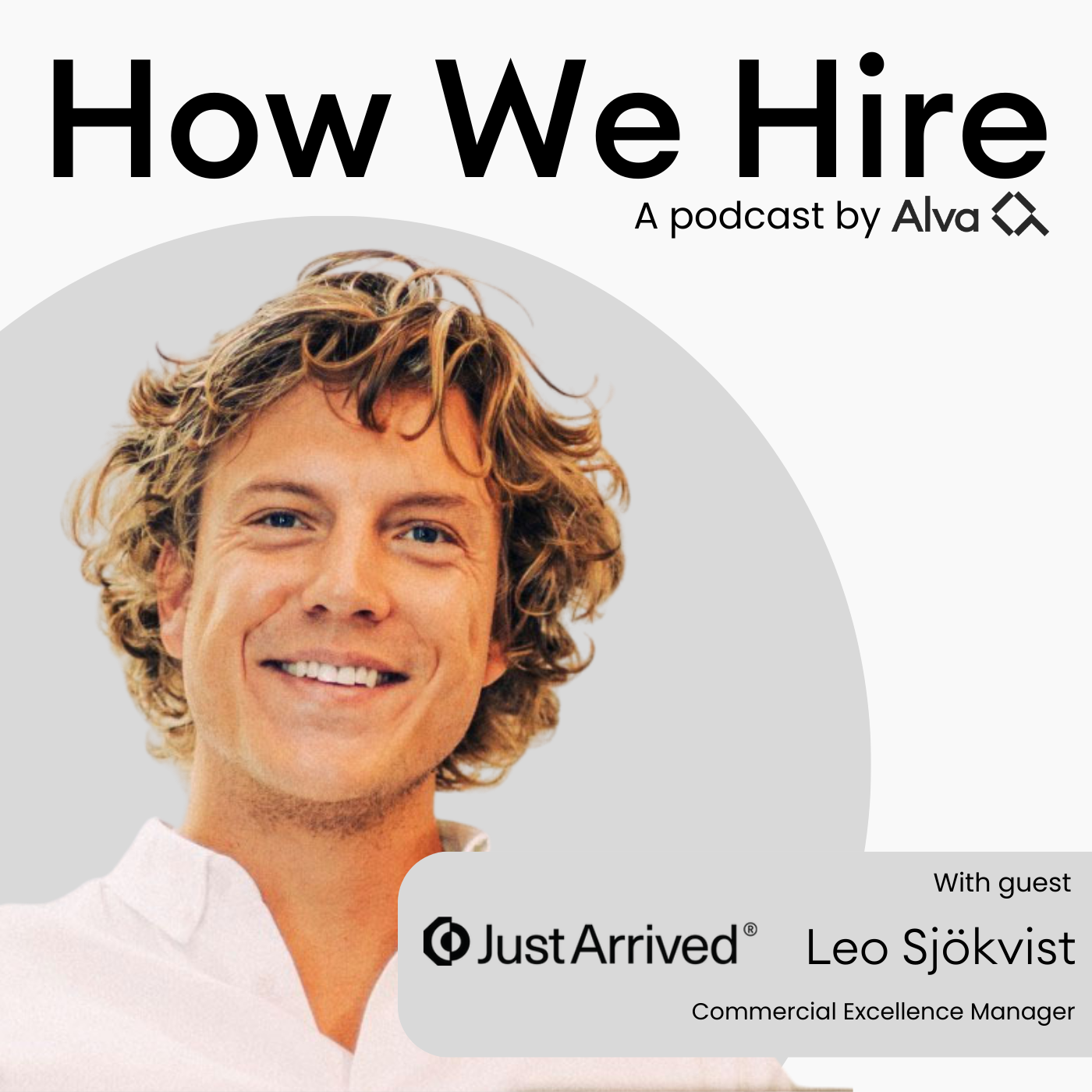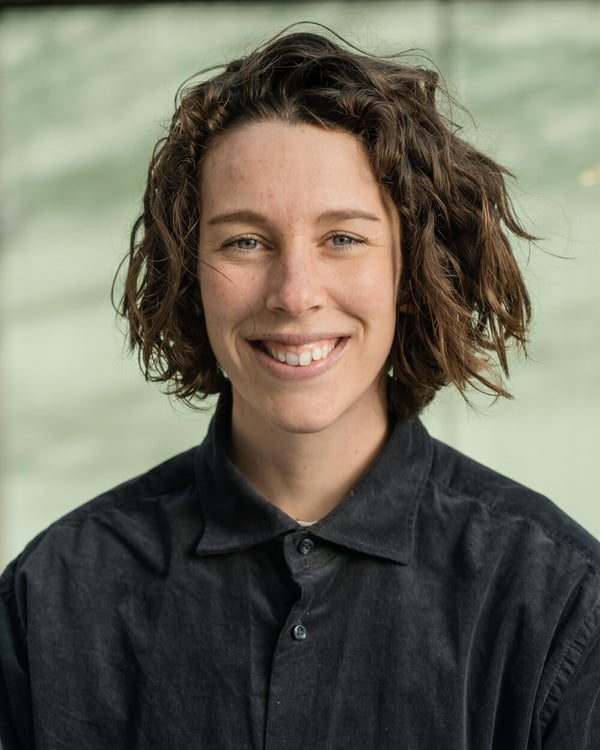How We Hire Podcast Episode 30 Transcript
Leo Sjökvist (00:00):
Just by changing the language that we are using on a day-to-day basis is a key factor to be able to attract international talent. And it might seem like super easy fix, but in discussions that we are having with companies that want to attract, the first thing we want to discuss is okay, but is it really a requirement to have Swedish [00:00:30] and nine times out of 10 it's not. It's only because people are comfortable in the way that they are or the way things are.
Linnea Bywall (00:48):
Welcome to How We Hire a podcast by Alva Labs with me, Linnea, licensed psychologist and head of People. This show is for all of you who hire or just find recruitment interesting. [00:01:00] In every episode I will speak with thought leaders from across the globe to learn from their experiences and best practices within hiring, building teams and growing organizations. Our guest on today's episode is Leo. Leo is an expert in
Linnea Bywall (01:19):
Brand management and executive recruitment with a focus on competence-based hiring. He's the commercial excellence manager at Just Arrived, a Swedish company committed to promoting equal [00:01:30] employment opportunities to foreign born talent. They offer services from recruitment to work, permit assistance targeting the untapped potential of international talent. Leah's work is pivotal in not only enriching the workforce but also in building a more inclusive society. So if you ever wondered how to leverage international talent to create a more dynamic and effective workplace, you're in for a ride and a treat today. Welcome to how we hire Leo.
Leo Sjökvist (01:57):
Thank you. Thank you. It's great to be on this [00:02:00] rollercoaster.
Linnea Bywall (02:01):
It's great to start the episode with promising that you're saving society.
Leo Sjökvist (02:07):
Exactly. It's no pressure. I can feel it already.
Linnea Bywall (02:11):
Exactly. Increased the pressure, but can you kick us off with telling us a little bit about your role as a commercial excellence manager as just arrived?
Leo Sjökvist (02:21):
Yeah, sure. And the role description is quite vague I would say. As you said, we are recruitment and staffing company working with international [00:02:30] talent in various ways, both getting people that are already in Sweden out to a job or assignment depending on the situation. And we also work with work permits. So companies already having often a person in mind and we help them through the process. And in my role it is pretty wide. I sit with everything from designing the ways that we are working so that everything that we do is in [00:03:00] line with the evidence-based way of doing things and also with branding. I sit with our CMS, basically our webpage and the systems of course why we have been in much contact since we have implemented Alva Labs and of course with the day-to-Day recruitment processes that we do with everything from having to dialogue with clients to sit in discussions and interviews with [00:03:30] specific candidates. It's basically everything and nothing but yeah, as you do when it's a small company, we're not as many as we have been before, but it's tough times for our industry in general as you may be. It's a tough time for almost all industries at the moment. Yeah,
Linnea Bywall (03:49):
It feels like there's a strong found, there's a story here to just around but before just touching on what you just mentioned, so whenever people are listening, we are in September, 2023, [00:04:00] what's the recruitment market looking like for people out there?
Leo Sjökvist (04:04):
Usually when it's tough times, the demand for staffing solutions often go up, which we can see clearly even today. But it feels like that the knowledge that goes into how to make a good recruitment gets better and better. We try to create a method and a process that is inspired a lot from executive search, which is my background [00:04:30] previously and it's not very common or I've never seen it being used within our target group, especially for blue collar workers. It's like companies in general see its only fits and legs, it's a bit swish, but that it's not as important to do the recruitment process in the best possible way. And I guess it's because recruitment in general [00:05:00] is quite expensive thing to do and especially when you do a faulty recruitment, it's very expensive. But by implementing these methods or this method that we have, partly by using tests as one of the first step of the recruitment like Alva Labs, we can see that the miss rate of people going all the way is close to zero.
(05:30):
[00:05:30] Wow. We can see that the fit that people or the company's experience and also from the candidate perspective is super successful. Why it's often worth to go in and take in help when possible. It's even for blue collar workers, like using recruitment companies for key roles have been a trend for mean for [00:06:00] 30 years at least. And also having technology as a filter or a way of working, taking out the human errors in a way that we can do now by automating especially the beginning of the recruitment process by not do any kind of selection in the beginning, then we have a non-biased process. That's what we try to do to make it [00:06:30] as equal and as inclusive as we can.
Linnea Bywall (06:35):
And I think it's interesting the point that you bring with bringing a inclusive process with less bias in a world where biases are flying high. I mean it is unfortunately still the fact that when you are foreign board it is a struggle to get into the job market. It is, it is. You often have to take jobs that are, I dunno, below your pay grade if that makes sense, but [00:07:00] something that you're not trained for. Oh
Leo Sjökvist (07:02):
Yeah, definitely.
Linnea Bywall (07:02):
Based on all this, what drove just arrived to focus on helping this group of people on the job market.
Leo Sjökvist (07:10):
Yeah, that's a super relevant question, but it's the whole foundation why we do what we do and how we do what we do. Even though the how have progressed in every single way just right was founded based on idea that all talent is of value. [00:07:30] And 2015, 2016 when it came around 170,000 people, a lot of people coming from Syria, it was 250 volunteers gathering and helped people basically going out to the airport, going and helping people to their first or second job in Sweden. And that's the core still I would say helping being this stepping stone, helping companies, helping people [00:08:00] to their first or second job in Sweden. And like you said, we can see people working in warehouses with a double PhD and when I came in to just arrived I thought, this is so sad and I still think it's sad, but we can see that getting a job, any kind of job, even though it's a job way below your level of experience is still better than not having a [00:08:30] job.
(08:30):
Jobs are one of the major keys to integration into society and culture. Housing and jobs are the two biggest key factors being integrated in a society at whole. And we can see this as well the progress that individuals do in such a short time. We can see that people have been unemployed for years, sometimes seven, [00:09:00] 10 years not having one single job in Sweden. And we have methods of seeing and identifying who and which people are a good fit for different specific roles and jobs. Giving people a shot is of course wonderful people that thought I'm forgotten, I'm outside of the game. I can never do and work within my field again. It's unfair [00:09:30] and it's not right like unleashing this true talent and it's not only people that are coming to Sweden right now, it's people that are actually in Sweden, a half a million people that are in Sweden that are unemployed and can contribute so much and they're skillset and potential. It's a super cringe analogy, but I don't know if it's an Einstein quote [00:10:00] even, but I got it from a meme. Let's say
(10:05):
I got it from a meme and everybody's a genius, but if you judge a fish on its ability to climb a tree, it'll live its whole life thinking it's an idiot. This is true for a lot of people in general, but for a lot of people in our target crew, especially people that are coming often as central figures in context in society and coming [00:10:30] to Sweden when, and the only thing that we ask for or the only thing that a lot of companies in Sweden ask for is that you should speak Swedish. And that's the only thing that they don't have in their luggage. They have vast education and experience often and within different fields, which is greatly demanded here in Sweden. But [00:11:00] the only thing that really counts is that they should speak the Swedish language and that's of course impossible not to crack for somebody who just arrived so to speak,
Linnea Bywall (11:13):
To be sure. And I mean you obviously are up against some powerful forces, not that anyone is deliberately mean and not want to give someone a shot. It's just that the way that we tend to do hiring, we will be impacted by, as you say, [00:11:30] language, where have you studied, what have you done? If you're not something I can recognize and have a reference to, it's going to be harder for me to grasp who you are. So you said you find the people and match them with the right opportunity. How do you do that? Can't you just go through, you get an assignment? How do you fill that decision?
Leo Sjökvist (11:51):
That's a great question and I wish there was a super easy answer. Is
Linnea Bywall (11:55):
There no meme you can refer to
Leo Sjökvist (11:58):
An Einstein meme? Well, there [00:12:00] should be,
Linnea Bywall (12:02):
Now it's time.
Leo Sjökvist (12:03):
It's pretty easy to create a meme and just quote Einstein. He can have said anything.
(12:10):
But I would say creating the process and method that we use is by including more people in the beginning of the process, we are using ads that we post on 11 sites, which is [00:12:30] of course it's not of a need to have, but it's always helpful just to be visible. We have a closed corporation with a lot of the roost matcha suppliers. The Rusan matcha suppliers are basically suppliers to Arling helping them out with exactly what the name tells to prepare a ssta and match people out to jobs. But [00:13:00] the ssta matches company's ability to actually match people. It's pretty good, but they often have so few people each company. So we have partnership with I think it's almost 500 of these companies. And when we get an assignment, we send a short description to these matcha suppliers. We contact a [00:13:30] by adding role description to which is visible to our network, we activate our network, which is of course super unique to us. We have almost 50,000 people in our network, which is updated every 24 month based on GDPR. It's updated and relevant and these are people who are somehow [00:14:00] open to new opportunities. So if we put up a job within transport for example, then all the people that have shown any kind of interests or applied before to any job within transport is getting emailed and we encourage people to apply and this is the first step. So the first step of the recruitment process then we include often maybe 700 people are part of the first step.
Linnea Bywall (14:29):
And [00:14:30] just to sum it up, it sounds like shipping your job ads to a various amount of job boards, communities, getting people to see that visibility, to collaborate with relevant stakeholders, both like government, communities, companies to reach as many people as possible and get them to the opportunity. Is that a fair summary?
Leo Sjökvist (14:54):
That basically sums it up and also having close partnership with schools [00:15:00] and other companies and looking in the rear mirror for assignments that are similar to this one and then encouraging or getting in contact with these people that were, because in recruitment in general, it's only one person that gets the good news of getting hired and we have maybe 10 people that are sad but trying to activate or disappointed but try to activate these people that have done the tests that we have done [00:15:30] the interviews with that are super, super, super good candidate but have just fell on the finish line. We try to activate those as much as we can and see and try to find these synergies between the different assignments that we do. And then we do tests or I would say there is of course a small filter between people that apply and then doing the tests and it's the screening questions, trying to find [00:16:00] based on competence based questions, what's expected and needed as requirements in the role.
(16:07):
And then they do the tests and then we have of course shortened down the list very, very much from 700 people to maybe 70 people. And then we go in and screen resumes, we go through how they have answered and how they have done the tests and we follow [00:16:30] this percentage target match depending on which role we are recruiting for. That's the first steps. And on these steps we don't interfere at all because we try to be as possibly can. And we do this by being more inclusive with what people gets to see the job opening and apply and then having the first steps of the recruitment [00:17:00] process fully automated. And you only proceed in the recruitment process if you have successfully answered the questions and the tests. But of course we often go through, but this is more of a to see that if people have answered that it's actually they are in the step that they should so that we don't miss anybody who's actually good for the role.
(17:24):
And then we have done like 95% of the recruitment process, then [00:17:30] we interfere, then we take this, we make decisions based on the questions and based on the answers and we do interviews, we do a background check, we do digital reference taking. So in every step of the way we try to design the process so that we can handle more processes, but that the process never misses a good potential [00:18:00] or talent. So yeah, that was the long and vague version of our recruitment process works and it's the same process even if it's ACEO to a big group company or if it's a warehouse worker, we use the same process
Linnea Bywall (18:20):
And I think that in itself is pretty neat. And just to try to summarize the process you described, it's like opening up the initial part of the funnel including [00:18:30] as many people as possible, interfering as little as possible, and then go into the fine tuning and human aspects or fine touches of the
Leo Sjökvist (18:41):
Recruiter. Yeah, definitely. Definitely.
Linnea Bywall (18:44):
Okay. So what would you say are the key qualities that you look for when it comes to international talent? Is it different from hiring someone locally?
Leo Sjökvist (18:52):
Well, it depends what we are looking for. Of course there are qualities that are [00:19:00] more rare in Sweden, there are industries that are screaming for competence or talent within butchers and so on. There are no educations for becoming a butcher or a meat cutter in Sweden at the moment it's handled only through the specific slaughterhouses. So there are partly that where the competence is actually not [00:19:30] available in Sweden or you can see that people start working as you cannot educate yourself becoming a butcher, but you go out and work at the slaughterhouse and then they educate you learning by doing. But this is just a very fraction of the total amount. But I would say it's not a huge difference, but we are opening the possibility for companies to hire [00:20:00] or we try to open the possibility for companies to hire the right person. I would say it's pretty close to what we discussed in the earlier with our method by including more people.
(20:15):
So diversity and inclusion is of course super buzzy. Everybody's talking about diversity and inclusion, but it's not super common that companies are actually having a strategy for how to work [00:20:30] with these questions. But when I found just arrived from the beginning, I was working at a executive search firm. We do not have to mention any names, but one of the bigger ones and more established ones. And one of the first things that I wanted to do was okay, but we can see clearly I've been in recruitment for or within recruitment for a couple of years then [00:21:00] and I could see clearly that one of the biggest problems within recruitment is that you only stick to your own network. And if you start working for a position, we're looking for, for example, product owner. And then I've been doing so many product owners, so I just go back to my own shortlist of product owners and check their interest and availability.
(21:30):
[00:21:30] It's just how I did it and I think it's the most common way because people in general, if we are already having a good way of working, why reinvent the wheel? If I already have a short list of good product owners, why would I challenge myself and go outside my own network? And that's why I got in contact with just arrived from the beginning. So I said, okay, [00:22:00] so we have an opportunity here for a good partnership just arrived had and still have great talent, great people and candidates for all types of roles, but the only thing that they are lacking is the opposite of what recruitment companies in general are lacking of and it's good candidates, or did I say that right? Just arrived [00:22:30] is the only thing they were lacking was assignments and the only thing but had so many good candidates. And the only thing that they were lacking, which the other recruitment companies do have is assignments often because they're more established on the market and are often the, some companies more than others are the go-to when companies need to recruit of course.
(22:59):
And [00:23:00] that was my idea for the partnership. If one third of every people that we present in an assignment are for and born, then the companies at least have the choice of recruiting diverse. But if they don't have the choice, it'll never change the way things are. And I got to know, just arrived more and more and it ended up me going [00:23:30] fully to just arrived because it was just too interesting to work with these questions and to be able to drive change bottoms up instead of course it has to be an executive decision to work with diversity and inclusion. It should not be only a HR question because my experience is that if you present new ways [00:24:00] of thinking and ideas and not having the business perspective and the why, HR tends to do the same way and work the same way they have always done. So it must come from above is at least my experience.
Linnea Bywall (24:19):
So say now that we have a bunch of HR people listening and they want to get the top down to understand the strategic benefits of hiring diverse [00:24:30] international candidates. What's the pitch?
Leo Sjökvist (24:33):
I would say it's very optimistic to think that by only looking inwards within Sweden's boundaries, it's to be able to find the right person. I mean there are 3.5 billion people worldwide in the work or labor market and two of them are speaking English. So the potential is [00:25:00] vast. We have the possibility to find so much great talent if we are able to attract them. The first thing I would encourage companies to do is by starting and communicating and writing things in English because we are the top two, we are the second biggest non-native English speaking country [00:25:30] next to the Netherlands that are actually speaking the best English in the world. I think it's like 70% speaking good English and being inclusive just by changing the language that we are using on a day-to-day basis is a key factor to be able to attract international talent. And it might seem like super easy fix, but in [00:26:00] discussions that we are having with companies that want to attract, the first thing we want to discuss is okay, but is it really a requirement to have Swedish and nine times out of 10 it's not. It's only because people are comfortable in the way that they are or the way things are.
Linnea Bywall (26:26):
Yeah, I think I honestly had a personal epiphany a couple [00:26:30] of months ago when I was talking to someone around this topic and I realized I never ever want to work for an organization that doesn't have English as their business language. Because being in HR recruitment, that's going to just dramatically decrease my chances of fulfilling my role description of hiring talented people. But also, I mean we are like 60 plus people at Alva and we have 18 different nationalities and everyone speaks English all the time. [00:27:00] It's a lot more fun when you get to work with a bunch of different people. It's both like I couldn't do my job if we didn't speak English and I wouldn't have never had as much fun and learn as much if we didn't speak English because it would have so many implications. So I understand that it is a massive thing and I don't think it's that big of a shift, but maybe that's
Leo Sjökvist (27:24):
No, I agree
Linnea Bywall (27:25):
And everyone won't agree
Leo Sjökvist (27:27):
Working at Just Arrived is the first company [00:27:30] where we use English first, but that's why, because we try to walk the talk of course, and we try to have as diverse being a diverse company when it comes to age, when it comes to gender, when it comes to nationality, and also that all the interns that we bring in that wants to work with us and working with international talent [00:28:00] speaks English.
Linnea Bywall (28:01):
But we agree. And you know who else would agree? A meme from Einstein would agree
Leo Sjökvist (28:06):
That definitely
Linnea Bywall (28:08):
You speak English. So I think that makes us three.
Leo Sjökvist (28:11):
That makes us three. Exactly. It's the general rule of thumb here
Linnea Bywall (28:17):
In this podcast studio. We're now three. I know you have some fantastic stories of the candidate that got hired and turned out to be this fantastic stupid story. Sometimes [00:28:30] I think storytelling is an underrated tool to speed up change.
Leo Sjökvist (28:35):
Oh yeah.
Linnea Bywall (28:36):
Do you mind sharing a couple of stories, one or two about when you found the talent that made the difference and that no one would've hired unless you were involved?
Leo Sjökvist (28:46):
Yeah, well then I think it would be very, very many stories because we hold the hand of each, the candidate and client so that we ensure that employment will [00:29:00] work. Sometimes it's tough, sometimes it's obvious and sometimes it's super easy. But I have a great example of this, how based on the test results, and not by looking at the cv, how a hire could check all the boxes and growing outside of the rose frames in just months, we [00:29:30] hired a person to be a driver. So the requirements for being a driver is pretty simple. You have to be able to navigate and you have to have Swedish driver's license, you have to be responsible. You are handling a vehicle. So we were checking for, and of course there are tons and tons of people who fill in this simple requirements, but we found [00:30:00] a person whose background is within airlines, he'd been working as a fly steward.
(30:07):
We said, okay, but this is based on the cv. We often try to find in the last steps of the recruitment after all of the steps are done. Often the examples that we get are, of course people that have a good fit for becoming a driver often have been working as a driver previously, [00:30:30] nine people out of 10 for when looking through the list of people who have successfully done the tests answered correctly on the screening questions were people who'd been working as a driver before and this was not the case. And so we looked through his profile and being open and the walking the talk and just because you haven't been working as this specific role before, but we tried to hire a lot on potential [00:31:00] and the tests and everything ensured us this is a great fit for the role. And we trusted the process.
(31:09):
We hired the guy, he started working and almost immediately things started moving for him. He got more responsibility, he became a team lead. And just within one year he was responsible [00:31:30] for the whole operations in Sweden. And the regional manager for this international company said, this is, I've never seen talent like this. I've never seen a person growing so fast, learning so fast and just seeing what needs to be done and just do it the way that this person managed to do. So this is just one of [00:32:00] many examples for similar situations. And I think it says a lot when you shift the way that we do recruitment and instead of doing the tests as a final step because it's so expensive and trusting your gut feeling because it worked so many times before and we've heard people saying and actually saying founders of big companies in Sweden saying, no, no, no, [00:32:30] but this is wrong when I hire, if I know within one second when a person walks in the room, I know if it's a hit or a miss. Of course it's very hard to discuss when you have that kind of opinion. But we have seen time and time again how effective this method is and using it within our target group. Within people [00:33:00] that are more working with entry level jobs is no exception, quite the opposite.
Linnea Bywall (33:07):
But speaking of misconceptions, are there misconceptions around hiring foreign talent that you would want and for all to shake people up and say that this is actually how it works. What is it that people have gotten all backwards?
Leo Sjökvist (33:25):
So the misconception is that it's super hard and the big change [00:33:30] that I would say is the most important and also especially for bigger organizations that already have their way of working established. And it's very hard to do and drive change and it is hard to drive and do change. It's one of the hardest things that you can do, of course, but it's easier than many people think to bring in people [00:34:00] with a diverse background. So that's partly it. And the fear of getting it wrong is often the failure itself. So companies are often afraid of hiring people that they don't get at first or that they don't know at first because you don't recognize the school that they've gone [00:34:30] to or you cannot see any familiar companies in the cv. So rather than trying to go outside of your comfort zone, it's so much easier.
(34:43):
And then of course this we can see on if you get a choice of hiring someone who you feel more alike or somebody who you don't recognize or [00:35:00] aren't very familiar with or it's people tend to in a hundred percent of the times to choose the person that they can relate to or that they can see themselves in or that have a similar educational history as you do. Why people that have a study background from the Stockholm School of Economics [00:35:30] only want to hire people that have economy bachelor from the School of Economics or TH or Sala or whatever you pick. They of course going to choose people because you had a great time there and you can relate to people with similar experiences. So by trying instead of just saying no because you are afraid of getting it wrong, I think [00:36:00] that people would be able to experience and appreciate more successful recruitments.
Linnea Bywall (36:06):
Yeah, I really liked the first point of it feels that it's going to be a lot harder. I just had a discussion with right before we went into a recording with a coworker that when she joined her previous job, she was the first international hire and it was a big deal, et cetera, et cetera. And when she left two years later, there were so many more. So I think it's also the big [00:36:30] shift. It's not as hard, it's not as big and it's a one time thing. And then you've opened up the talent pool of so many fantastic people.
Leo Sjökvist (36:39):
We shouldn't compare, but how we think before the first of anything, the first time driving in a car, the first kiss, the first job, or the first time trying sushi or whatever, it's often, [00:37:00] of course, we don't want to do what we fear, but it's often when looking back, I think that everybody can feel like, what was I even afraid of? What did I expect?
Linnea Bywall (37:14):
Sushi is great, sushi
Leo Sjökvist (37:15):
Is fantastic.
Linnea Bywall (37:18):
To wrap up, besides that, sushi is great. What actionable piece of advice would you like to offer HR professionals that want to take this route and tapping into [00:37:30] international talent pools? What should they do?
Leo Sjökvist (37:32):
It's hard.
Linnea Bywall (37:33):
No, you're supposed to say it's easy. Yeah,
Leo Sjökvist (37:35):
No, but it's hard to choose one. Okay. Okay. It's hard to choose one actionable piece of advice because there are so many, and I would say we should not sell, just arrived here. But you can always give us a call.
Linnea Bywall (37:53):
But I think that's
Leo Sjökvist (37:54):
Fair because we don't want to take over the whole recruitment process, but we can be [00:38:00] a good add-on to already existing processes or ways of working with recruitment. And we just discussed the fear of getting it wrong is often the failure itself. So trying to get out there and try because it's not as hard as it seems. And thinking and discussing diversity and inclusion is one thing. [00:38:30] And it often leads to just a quote somewhere how a company sees itself. But actually just trying to put down actionable things that they can actually do is, I would say a crucial step forward if we want to attract this vast amount of talent that is already in Sweden, but [00:39:00] also people who wants to come to Sweden.
Linnea Bywall (39:04):
So if I'm going to try at least to sum up the entire wisdom of the episode, so we can turn that into minutes. It would be switch to English, open up your talent pool, focus on potential, and then team up with experts that knows how this is done like yourself, Leo, either to get actual help or at least start the conversation and tap into that network. [00:39:30] I think that's at least, hopefully that's actionable tips that you can take with you.
Leo Sjökvist (39:36):
Yeah, definitely. And trust the process.
Linnea Bywall (39:38):
Great One, great
Leo Sjökvist (39:40):
One. Build evidence-based recruitment process and trust the process.
Linnea Bywall (39:45):
Yeah. And Einstein said that process.
Leo Sjökvist (39:47):
Oh yeah, yeah. Oh yeah. Many times.
Linnea Bywall (39:52):
Frequent saying, Leo, it was an absolute pleasure. Thank you so much for joining how we hire and hope to continue this discussion. If people [00:40:00] want to reach out to you, where can they find you?
Leo Sjökvist (40:02):
They can always check me out on LinkedIn and I'm sure you will add my full name or they can email me at Leo at just ride se. Perfect. Thank you. Thank you
Linnea Bywall (40:14):
Leo, and thank you for listening.
Leo Sjökvist (40:16):
Thank you, Linnea, Bye!
Linnea Bywall (40:19):
Bye!





